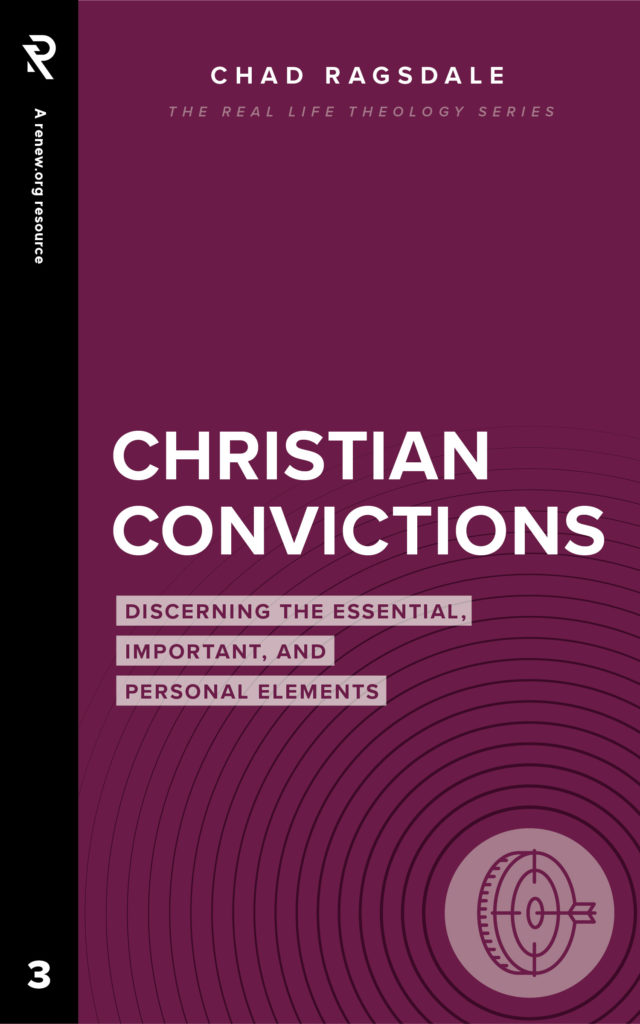
Confronting My Inner Deist
If I hadn’t already sworn off using the word, I’d say that I was deconstructing my faith a bit lately. Don’t panic. I’m not experiencing anything like a crisis of faith. In some respects, it’s just the opposite. Lately I’ve been questioning some of the unconscious assumptions that inform my faith with the result that my faith has come alive.
It started this summer as I was preparing to teach a new class in our graduate program on discerning culture and worldview. There is no topic I’ve studied more than this one. I’ve read countless books that address cultural analysis in some way or another. Many of these books are written from a biblical perspective, but I started to notice there was something critical missing in our efforts to understand and respond to culture.
I was rereading Ephesians devotionally and words and phrases that I have previously sped past started to jump off the page.
- God has “blessed us in the heavenly realms with every spiritual blessing in Christ.”
- This Christ is “far above all rule and authority, power and dominion, and every name that is invoked.”
- We were dead in our transgressions when we “followed the ways of this world and of the ruler of the kingdom of the air, the spirit who is now at work in those who are disobedient.”
- The manifold wisdom of God is being “made known to the rulers and authorities in the heavenly realms.”
- We are to “make the most of every opportunity because the days are evil.”
God has “blessed us in the heavenly realms with every spiritual blessing in Christ.”
And of course, remember that “our struggle is not against flesh and blood, but against the rulers, against the authorities, against the powers of this dark world and against the spiritual forces of evil in the heavenly realms.”
It dawned on me that Paul lived in a different world than I do. He didn’t live in a world where the spiritual realm was a mere abstraction. No, the powers and the principalities were real, and following Jesus faithfully in Paul’s world required the Spirit (capital S) of wisdom and revelation (1:17) and the fullness of the Spirit (5:18). In a spiritual war, disciples must be spiritually outfitted.
I don’t live in Paul’s thick world full of powers and dominions, rulers of the kingdom of the air, and spiritual forces of evil. I live in a thin world, a world of reason and rationality where demons exist only on the pages of the Bible and in the imaginations of cinematographers. I live in a world where most religious people would tell you they believe in the spiritual realm, including demons, but this isn’t something that they necessarily take seriously or devote much thought to.
“In a spiritual war, disciples must be spiritually outfitted.”
This is reflected in the mountain of books dedicated to cultural analysis. Most of these books effectively deploy tools like philosophy, history, and theology to understand culture, but almost never do they look at culture through the lens of spiritual warfare. (Peter Kreeft’s How to Win the Culture War: A Christian Battle Plan for a Society in Crisis is a notable exception.)
This is a strange oversight given just how prevalent the spiritual realm is in the pages of the New Testament. It’s hard to imagine Jesus or Paul or any Christian from antiquity “discerning culture” without any reference to forces in the spiritual realm. But modern commentators—many of whom are theologically conservative and believe in the truth and authority of Scripture—are almost silent on the issue. Why is this?
I think one reason is that our analysis of culture is informed by a Western philosophical tradition more than it is shaped by a biblical worldview. This Western philosophical tradition tends to keep the realities of the spiritual realm at an arm’s length. We’d rather engage in cool, dispassionate rationalistic analysis. We may be forgiven for labeling things evil, but we fear it might be considered uncouth or uncivilized to assign those evil things a label of “demonic.”
“We’d rather engage in cool, dispassionate rationalistic analysis.”
When explaining cultural phenomena, we feel it is safer to dive into an explanation from the “history of ideas” than to consider how that phenomena might be the byproduct of demonic influence. It might be safer to explore cultural phenomenon with the tools of psychology or sociology without any reference to powers and principalities.
We’ve essentially become deistic in our cultural analysis. We believe in God; we just don’t believe in the immediate reality of God in our midst. We believe in an abstract spiritual realm, but that spiritual realm is so removed from us that it may as well just exist on the pages of Scripture.
I’ve become convinced that no effort to analyze, discern, or respond to culture is complete without reflection on how the powers and principalities might be at work. Frankly, I have no idea how to make sense of some of what is happening in culture without reflection on the demonic. It doesn’t mean that we neglect the history of ideas, philosophy, psychology, or sociology, but we should learn to consider how spiritual forces may be at work in those things.
“I’ve become convinced that no effort to analyze, discern, or respond to culture is complete without reflection on how the powers and principalities might be at work.”
Adding to my personal deconstruction, I just finished reading Craig Keener’s book on miracles, called Miracles Today: The Supernatural Work of God in the Modern World. Keener is a well-respected New Testament scholar. This is a shorter version of a two-volume book (1200 pages!) on miracles written in 2011.
I used to teach a freshman class on the book of Acts. Whenever we got to the miraculous accounts in Acts, I would pause and talk about a biblical understanding of miracles today. One of the things I told my students is that there are two mistakes we should avoid when it comes to assessing the stories of miracles in our world today: gullibility and cynicism.
Gullibility believes every single miracle account. More than that, gullibility tends to see the miraculous in everything, thus undermining one of the essential characteristics of miracles, which is their rareness.
Cynicism, on the other hand, is dubious about every miracle account. Cynicism is always looking for a reason not to believe. Both gullibility and cynicism are uncritical. They assume the answer without really pondering the question. In the place of these extremes, I recommend curiosity. Curiosity doesn’t know the answer ahead of time; it is open to all answers. It is open to the possibility of the miraculous occurring in our world today, but not without sufficient evidence or justification.
“In the place of these extremes, I recommend curiosity.”
I think I was correct in this advice, but like a lot of advice that is basically correct, it is easier to give than to follow. My own disposition toward miracles has embraced some of the same deistic assumptions mentioned above. There’s a disconnect that has unconsciously wormed its way into my faith. I believe in the miracles of Scripture. On some level, I believe that miracles still occur today. But I have become extremely dubious, even cynical, about the reality of miracles. My posture has become one of unbelief rather than openness.
Upon reflection, I think this posture is related to my own bigotry. First, there is cultural bigotry. David Hume, in his famous argument against miracles, dismissed reports of miracles as existing only among “ignorant and barbarous” people. I would never endorse such blatant bigotry and smugness, but I have to admit that much of my skepticism about miracles is the byproduct of some of the same unconscious bigotry. “We are sophisticated enough and civilized enough and advanced enough to know that there are usually other explanations for miraculous claims.” Condescension takes the place of curiosity.
Second, there is theological bigotry. I am not a part of a tradition of faith that embraces healings. In fact, I grew up in a tradition that cast a side-eye at the type of faith traditions that embraced healing. Now, some of that skepticism was and is warranted, but what is unwarranted is assuming that I can dismiss miraculous claims by simply associating them with a theological tradition that I’m not a part of.
“What is unwarranted is assuming that I can dismiss miraculous claims by simply associating them with a theological tradition that I’m not a part of.”
This bigotry is unjustified and arrogant. Why would I automatically discount the experiences of a believer just because of their denomination or their cultural background? Keener points out that the assumptions we make about the miraculous aren’t even true. He gives dozens of authenticated stories of miraculous healings—many from the majority world, but many others in our own backyards, many associated with Pentecostal expressions of faith, but many others among very non-Pentecostal believers. Even if you discount some of the stories in the book, there’s no way to read Keener’s book with an open mind and come to any conclusion other than that God is still performing the miraculous today.
I’ve had to repent of my faith—a faith that has become too rationalist and too deistic. With any repentance, there is a turning away from one thing and a turning towards another thing. The thing I’m turning towards is the faith of the Bible, a faith that is not merely open to the spiritual realm but is regularly impressed by its reality, a faith that does more than affirm “the miraculous” but actually expects God to act in this world and in the lives of individuals. I’m rejecting the thin world of secularism in favor of the thick world of Scripture. I’m guessing that I’m not the only one who needs to be moved to repentance.







